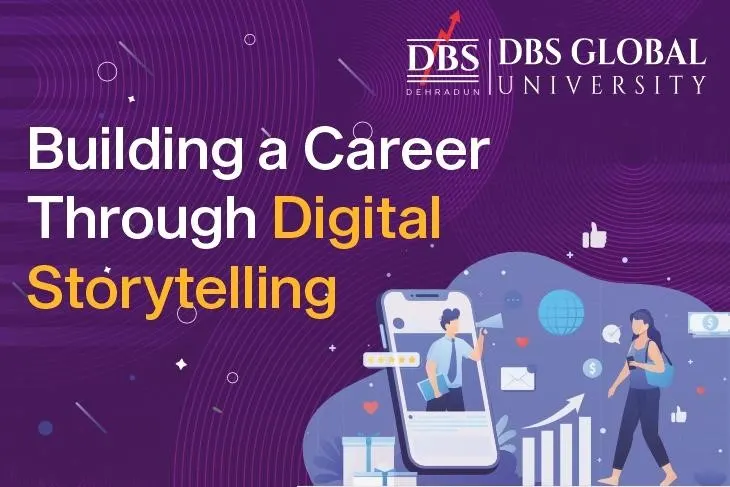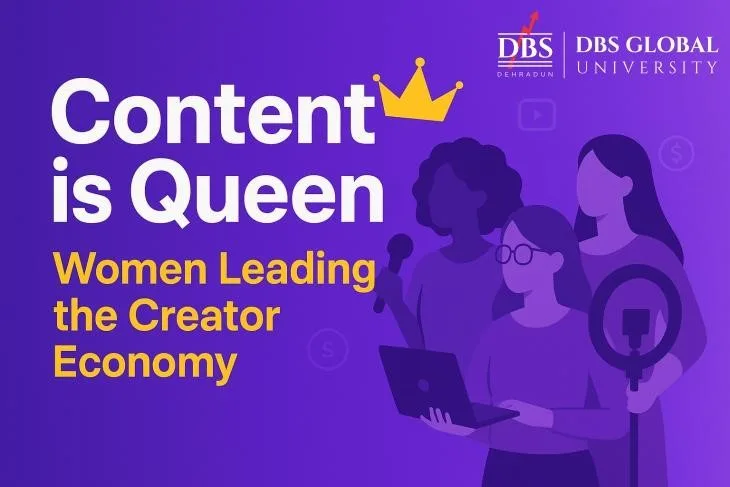
Building a Career Through Digital Storytelling
admin
- 0
You do not need a film degree to be a storyteller anymore.
Welcome to the Age of Everyday Storytellers
You do not need a job title to tell stories. You need a voice.
For the first time in history, a teenager in a small town can launch a podcast that gets streamed in ten countries. A working professional can share lessons from their life and build a loyal following on LinkedIn. A retired teacher can go viral for a two-minute Instagram reel about her garden.
This is not just content. This is currency.
People do not want more information. They want meaning. They crave stories that feel real, not rehearsed. Relatable, not robotic.
If you have something to say, someone out there is ready to listen.
So, What Is Digital Storytelling Really About?
Forget the buzzwords for a second.
Digital storytelling is not just about going viral. It is not about filters, clickbait, or jumping on trends before they go stale.
It is about this:
Can you make someone care with a screen between you and them?
At its core, digital storytelling is the art of making people feel something with a photo, a voice, a sentence, a swipe. It is turning raw moments into meaningful content. It is showing, not just telling. It is a connection, wrapped in creativity, delivered in pixels.
Let us break it down:
- ● Words that stay with you (think newsletters, blog posts, captions, scripts)
- ● Visuals that speak louder than text (videos, reels, carousels, short films)
- ● Sound that paints pictures (podcasts, voiceovers, background scores)
- ● Interaction that builds community (polls, lives, comments, DMs, storytelling series)
The Voice That Built a Universe
If you ever thought podcasts and audio stories were “niche,” meet Neelesh Misra. He built a devoted audience through Yaadon Ka Idiot Box, where his warm, nostalgic narration turned memories into magic.
Yaadon Ka Idiot Box became a heartbeat for listeners in India and Pakistan.
Starting in 2011 on BIG FM, a radio network reaching over 34 crore Indians across 1.2 lakh villages, Misra turned audio into magic through nostalgia and warmth. That’s storytelling, simple and powerful. No flashing visuals. No viral dances. Just voice, heart, and timeless tales. Today, he runs a full-fledged content network and proves that audio is not just background noise. It is a career in surround sound.
It is not one skill. It is a weaving of skills, empathy, creativity, tech fluency, and narrative structure working together to tell a story people want to be part of.
The best digital storytellers do not just inform.
They inspire, entertain, challenge, and sometimes… quietly change lives.
Skills You Actually Need to Build This Career
Let us clear one thing up: you do not need to master everything.
You need to master the right things, the ones that make your storytelling unforgettable.
Here is your creative toolkit:
Story Sense (a.k.a. Knowing What Grabs Attention)
Not every moment is a story, but every story starts with a moment.
You will learn to spot stories in everyday life: a conversation, a mistake, a behind-the-scenes mess-up. The best storytellers make the ordinary feel extraordinary.
Think like this: “What would make someone stop scrolling?”
Writing That Feels Like Talking (But Smarter)
You do not need to be a poet. You just need to write like a human.
Clear. Sharp. Honest. Whether it is a caption, a script, or a blog, your words should sound like you just on your best day.
Rule of thumb: if you would not say it out loud, do not write it.
Visual Fluency
It is about impact, not aesthetics. Learn framing, natural light, clean design, tools like Canva or CapCut help, but taste is king. CapCut alone had over 410 million downloads in 2024
Get friendly with Canva, CapCut, or even your phone’s camera grid.
Platform Literacy
Instagram, YouTube, LinkedIn, Substack, and Spotify all have their own languages. Learn what works where. A tweet is not a YouTube video. A carousel is not a reel. And a podcast is not just someone rambling into a mic.
Do not just post. Understand the platform’s vibe.
Audience Empathy
This is your secret sauce.
Who are you talking to? What do they care about? What do they need today for inspiration, a laugh, a nudge, a solution?
Storytelling is not about you. It is about them.
Start by listening more than posting.
Consistency Without Burnout
Yes, you need to show up. But no, you do not need to be online 24/7.
Build systems. Batch content. Take breaks. Create a rhythm that lets you sustain your voice, not just shout once and disappear.
Think of the long game. Think storyteller, not content machine.
Each of these skills is learnable. None of them require a fancy degree. And together? They are the foundation of a career that is creative, impactful, and future-proof.
Where Do I Start If I Am a Total Beginner?
Right here. Right now. With what you already have.
You do not need a fancy camera. You do not need a viral moment. You definitely do not need to wait until you “figure it all out.”
Here is how to start, even if you feel like a complete amateur:
Pick Your Playground
Choose one platform. Just one.
The one where you actually enjoy spending time. The one that fits how you think, short-form, long-form, video, writing, or audio. Instagram? Start there. YouTube? Go for it. LinkedIn? Underrated goldmine.
Start where you are curious, not where you feel pressured.
Laksh Maheshwari, known online as Single-Handedly, began creating soulful, poetic reels from his phone after losing a hand in an accident.
He did not wait to be “ready.” He started with his voice, his words, and his truth.
Today, his storytelling touches thousands, proving that sincerity beats polish, and a clear voice can reach hearts across the world.
Tell One Story a Week
Not five. Not fifteen. Just one.
It could be a personal lesson, a behind-the-scenes look at your process, a conversation you had, or a quote that made you think. Frame it. Shape it. Share it.
Volume will come. First, build voice.
Detective Boomrah Was Born on Social Media
Sudhanshu Rai began narrating spooky, suspenseful stories online just for fun. People got hooked. One story became a series. One character, Detective Boomrah, became a cult hit.
Now? He runs a production company, stars in his own stories, and makes money through branded content, IP rights, and live storytelling shows.
Learn Just Enough Tools to Get Going
Canva for design. CapCut for video. Notion for planning. Description for audio.
You do not need to master everything; just pick one tool and explore it like it is a toy, not a test.
Creativity first. Tools are just the support crew.
Follow Creators Who Inspire (and Reverse Engineer Them)
What makes their content pop? How do they open their videos? What kind of stories do they tell? Do not copy study. Good creators are great teachers, even when they are not trying to be.
Steal like a storyteller. Build like an original.
5. Share. Even If It Scares You.
The first post will feel awkward. The first reel might flop. The first blog might echo in an empty hallway. Post it anyway. Press publish anyway. The only way to find your voice… is to use it.
You cannot improve a story that is still in your drafts.
Most people never start because they want to be great from day one.
But in storytelling, digital or otherwise the ones who win are the ones who keep showing up.
Turning Digital Storytelling Into a Career
Let us get one thing straight: this is not just a hobby.
Digital storytelling is a full-blown industry, and it is growing faster than most people can type “personal brand.”
Brands, creators, nonprofits, startups, schools, media houses, and even government bodies they all need storytellers. Why? Because content is how people connect now. And great storytelling is the sharpest tool in the digital kit.
Here is how this becomes a career:
- ● Become a Brand’s Voice (Even If It Is Not Yours)
- ● Build Your Own Personal Brand
- ● Freelance Your Way to Freedom
- ● Join Companies That Value Storytelling
- ● Collaborate, Create, and Keep Evolving
Final Thoughts: Your Story Is Already Your Superpower
You do not need permission to start.
You do not need to wait until you are “qualified.”
If you have lived, observed, felt, failed, tried, laughed, lost, and dreamed, you already have everything you need to be a storyteller.
Digital storytelling is not about having the loudest voice. It is about having a voice that matters.
And that voice? It is yours.
There has never been a better time to build a career around creativity, clarity, and connection. You do not need to be famous. You just need to be genuine and consistent.
So tell your story. Shape it. Share it.
Let it evolve, let it be messy, let it be yours.
Because out there, someone is waiting to hear exactly what you have to say.
And who knows? Your next story might be the one that changes everything for someone else, and maybe even for you.
FAQ: Frequently Asked Questions
Q1. What is digital storytelling, and why is it important today?
Ans. Digital storytelling combines creativity, technology, and communication to share ideas that connect emotionally with audiences. It helps brands, creators, and individuals stand out in a crowded digital space.
Q2. Can I build a career in digital storytelling without a media degree?
Ans. Absolutely! A degree helps, but curiosity, creativity, and consistent practice matter more. Many successful creators started with just their phone and an idea.
Q3. What skills do I need to become a digital storyteller?
Ans. Core skills include writing, video editing, content strategy, visual storytelling, and audience understanding. You can strengthen these through practice or professional programs such as DGU’s Communication and Media courses.
Q4. How can I start a digital storytelling career as a beginner?
Ans. Start small — pick one platform, share one story a week, and refine your craft through feedback. Consistency and authenticity are key.
Q5. What are some examples of successful digital storytelling careers?
Ans. Many professionals today work as brand storytellers, social media strategists, content creators, podcasters, and digital journalists. The opportunities are growing across industries.
Your next story might be the one that changes everything.


